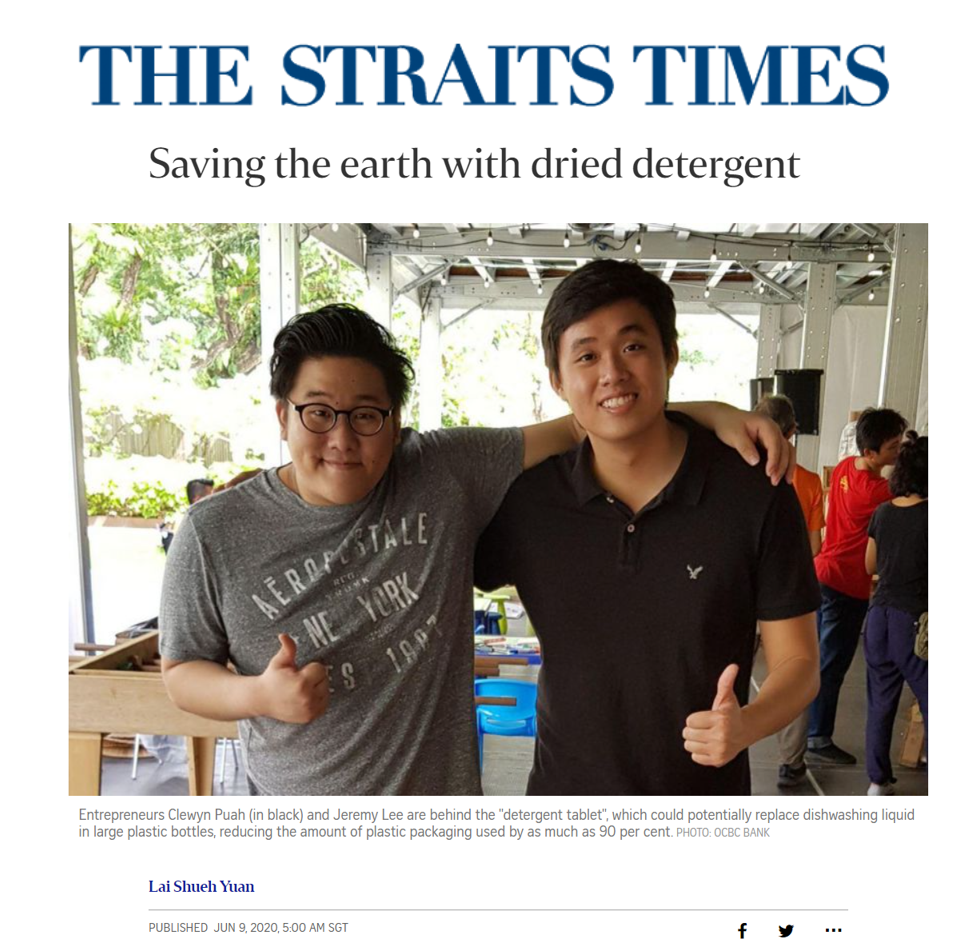
This article was originally adapted from The Straits Times.
Saving the earth with dried detergent

Just add water. That is the simple but creative solution by Mr Clewyn Puah, 26, and Mr Jeremy Lee, 27, two entrepreneurs who hope their "detergent tablet" will replace dishwashing liquid in wasteful large plastic bottles.
Their dehydrated cleaning product could cut the amount of plastic packaging by as much as 90 per cent, and lead to lower carbon emissions through the reduced shipping volume and weight, they said.
Their Team SimplyGood project was one of five selected last year by OCBC Bank - out of 67 projects - to receive funding from the #OCBCCares Environment Fund.
The total funding of $100,900 for the five projects will help teams further develop their innovations.
The other projects aim to tackle food waste through composting or by ensuring that unsold food is offered to consumers; to promote reusing and recycling through a subscription-based clothes-swopping service; and to provide a method of using rainwater to clean items meant for recycling.
Mr Puah and Mr Lee, who have degrees from the Singapore Management University in accountancy and information systems respectively, are co-founders of UglyGood, a start-up that upcycles fruit waste by turning it into valuable products.
The road to developing the dehydrated detergent was a steep one, they said, as neither of them was trained in science.
While they worked with companies that had the relevant expertise, they had to do their own research on the tablet's formulation as well as tests to determine its cleaning efficacy.
They also engaged an external organisation to conduct microbial tests on how well their product cleaned items.

They aim to commercialise the product by the end of the year, with different types of tablets for different uses such as dishwashing, hand washing and general cleaning of the home.
"If we can deliver the active ingredients for these cleaning products to buyers in tablet form, this can reduce the need for repeated production of plastic bottles each time someone buys a bottle of detergent," said Mr Puah.
According to the National Environment Agency, Singapore disposed of nearly three million tonnes of waste last year, of which about 30 per cent, or 930,000 tonnes, was plastic waste.
Last year, only 4 per cent of plastic waste was recycled.
The effort to reduce waste - and the resulting carbon emissions from its incineration - is in line with OCBC's ongoing efforts to help tackle climate change, and its #OCBCCares Environment Fund is one such initiative.
Last year was the final year that the fund would be used for start-up projects.
Ms Koh Ching Ching, OCBC's head of group brand and communications, said these projects now have other sources of funding to call on.
"Instead, we will explore how our #OCBCCares Environment Fund can provide sustainable and strategic support upstream, to help mitigate pressing climate change issues such as rising sea levels and increasing temperature," she said.

